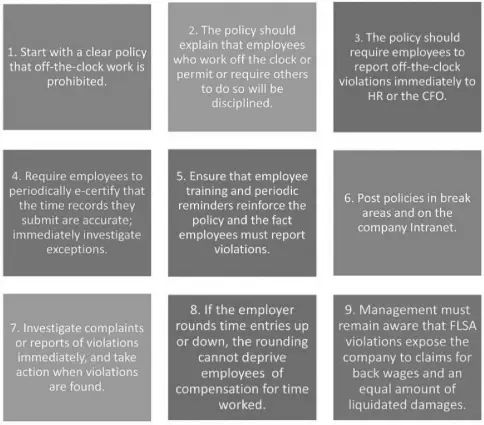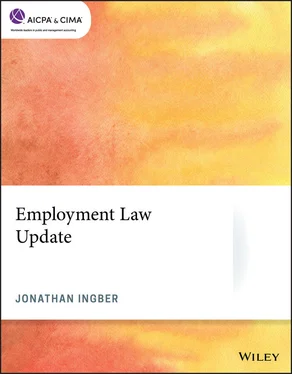rarely enforced its policies prohibiting off-the-clock work,
forbidden employees from writing off-the-clock work on timesheets,
caused employees not to record off-the-clock work for fear of discipline, and
imposed corporate budget constraints on employee pay that led to off-the-clock work being performed to meet operational deadlines.
The FLSA is clear: Nonexempt employees must be paid for all hours worked. If employees work before or after scheduled hours, during breaks, or while waiting for a shift change, that work must be compensated.
The lesson: Having unenforced policies in place that forbid off-the-clock work will leave an employer exposed to FLSA class-action liability to the same extent as if the employer had no policy at all. 5
Countering the off-the-clock problem: Best practices
Employers must be proactive in many respects if they are to avoid ending up in Dollar Tree's position. The following are among the practices an employer should consider implementing to avoid this result:

1 Which allegation was featured in the FLSA suit by current and former employees of Dollar Tree?Failure to properly record wages.Failure to compensate employees for time worked.Failure to accrue vacation compensation.Violation of the minimum wage laws.
2 An employer concerned about FLSA suits for off-the-clock work faces penalties, includingPunitive damages.Back wages.Back wages and liquidated damages.Compensatory damages.
 Case study 2-2: You are a justice
Case study 2-2: You are a justice
Jesse and Laurie worked for a company that provided warehouse staff to Amazon.comthroughout the United States. Their primary duties were retrieving products from shelves and packaging the products for delivery to Amazon customers. When their shifts were done, Jesse and Laurie — and all other warehouse employees—were required to remove their belts, wallets, and keys and pass through metal detectors.
Jesse and Laurie sued the staffing company, alleging that the time spent waiting in line for screening, removing personal articles, and passing through the screening process was compensable time. The judge in federal district court found that the screenings were not an integral and indispensable part of Jesse and Laurie's principal work activities, and thus the time was not compensable. The appeals court disagreed, holding that post-shift activities are integral and indispensable to the employees' primary activities if they are necessary for the principal work performed and done for the benefit of the employer.
The staffing company appealed to the Supreme Court, on which you serve as a justice. How would you decide the case? Is the time compensable or not? 6
Social media: Applicant and employee rights
Following the example of California and at least 15 other states, the Illinois governor signed into law in July 2016 a bill that became effective January 1, 2017 that limits employers' rights to require or request an employee or applicant to disclose a username or password to the employer; to access personal social media in the presence of the employer; or to request or require that the employee or applicant add the employer as a “friend” or similar contact. The law also prohibits the employer from retaliating against an employee or applicant for refusing to comply with such a request, and prohibits the employer from disciplining or discharging (or threatening to do so) a noncomplying employee. The law broadly defines social media to include any electronic service or account, or electronic content including email, instant and text messages, blogs, videos, still photos, podcasts, internet profiles, and locations.
The Illinois law contains exceptions that are generally consistent with the exceptions allowed by other states. These exceptions include requiring
sharing of specific social media information reasonably believed to be relevant to an investigation of allegations of employee misconduct;
sharing of specific social media information reasonably believed to be relevant to employee violations of applicable laws or regulations;
the right of the employer to require or request an employee to disclose a username, password, or other information necessary to access an employer-issued device; and
the right of the employer to monitor employee use of an employer-issued device.
Other states are expected to pass legislation in 2019 that similarly will restrict the right of employers to obtain access to applicant or employee social media.
Job applicants would be wise to consider the following findings from a 2017 CareerBuilder survey: 7
70% of employers use social media to screen job applicants
69% of employers use online search engines such as Google or Bing to research applicants
54% of employers have found social media content that caused them to not hire an applicant
As of now, no state laws prohibit employers from engaging in these types of searches — which you can see are performed by an overwhelming majority of employers. Here are a couple of cautionary points:
If the company's hiring supervisor performs the research, he or she may learn, for example, that the applicant is of a particular race, practices a particular religion, or suffers from a disability. For this reason, social media and other searches should be performed by a non-hiring employee who is required to follow a policy that only job-relevant information is provided to the hiring supervisor.
Any search that encompasses driver's license information, credit, or financial information may be subject to the requirements of the Fair Credit Reporting Act and similar state laws.
Social media: Employer rights
In September 2012, the NLRB and an administrative law judge (ALJ) issued two significant decisions concerning electronic postings. In the case of Costco, 8 the full NLRB upheld Costco's policy that required employees to use appropriate business decorum in electronic communications, including posts. However, the following portion of the Costco policy was struck down:
Employees should be aware that statements posted electronically (such as online message boards or discussion groups) that damage the Company, defame any individual or damage any person's reputation, or violate the policies outlined in the Costco Employee Agreement, may be subject to discipline, up to and including termination of employment.
This provision was struck down on the basis that it could restrict permitted activities such as communications among employees that are critical of Costco's treatment of its employees.
Similar language in the EchoStar policy stated:
You may not make disparaging or defamatory comments about EchoStar, its employees, officers, directors, vendors, customers, partners, affiliates, or our, or their, products/services … Unless you are specifically authorized to do so, you may not: Participate in these activities with EchoStar resources and/or on Company time …
The ALJ in the EchoStar case held that EchoStar's policy was overly broad in two respects: first, preventing employees from making disparaging remarks about the company could intrude on employee rights to communicate about EchoStar's treatment of its employees (permitted action under the NLRA), and second, the prohibition of using social media on company time could cause employees to conclude they could not use social media on their own smartphones or devices before or after work hours, during rest breaks, or on lunch break.
Читать дальше


 Case study 2-2: You are a justice
Case study 2-2: You are a justice










